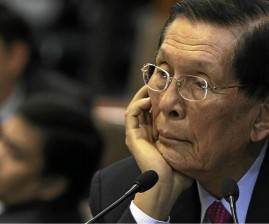MANILA, Philippines – Despite the inauspicious developments that bedeviled the government last month, its top officials still drew high trust and approval ratings, with Senate President Juan Ponce Enrile scoring the most improvement in his approval rating, according to Pulse Asia’s latest survey results.
Even in the midst of the hostilities between members of the Sultanate of Sulu and Malaysian authorities as well as the Supreme Court’s move to suspend the implementation of the Reproductive Health law, Pulse Asia’s Ulat ng Bayan survey showed that majority of Filipinos still approved of the performance of government top officials.
The Sabah issue and the halting of implementation of the RH Law were just two of the developments which preoccupied Filipinos when the Pulse Asia survey was conducted from March 16 to 20.
This was also the time when the controversy on the appointments of former Lanao del Norte Representative Macabangkit Lanto and lawyer Bernadette Sardillo as commissioners of the Commission on Elections [Comelec] made headlines.
Results showed that President Benigno Aquino III earned a 72-percent approval rating while Vice President Jejomar Binay improved by six points and received an approval score of 76 percent.
Enrile gained the most, improving by seven points to reach an approval rating of 53 percent.
The survey was conducted on 1,800 respondents and had a ± 2 percent error margin at the 95 percent confidence level.
Speaker Feliciano Belmonte Jr. (33 percent) and Chief Justice Maria Lourdes Sereno (32 percent) showed improvements in their approval ratings by six points each, but the survey said that the two officials earned the “lowest approval” of the five top officials.
Majority of Filipinos also gave high trust ratings to Aquino (72 percent), Binay (75 percent) and Enrile (51 percent) but again, the same cannot be said for Belmonte who scored 30 percent and Sereno who obtained a 29 percent trust rating.
Around one in two Filipinos was undecided on Belmonte, giving him 49 percent on both performance and trustworthiness.
They were also uncertain of Sereno’s performance and trustworthiness, giving her 50 percent on both counts.
In contrast, there was less ambivalence toward the performance and trustworthiness of the President (22 and 23 percent, respectively) and the Vice President (21 and 22 percent, respectively).
Sereno received a disapproval and distrust rating of 19 percent while Belmonte obtained 16 percent.
Meanwhile, both Aquino (4 to 6 percent) and Binay (4 to 5 percent) registered single-digit disapproval and distrust ratings.
Only Enrile showed significant change in his disapproval and distrust scores as these decreased by five percent from 16 percent down to 11 percent.
No substantial changes were recorded in the top officials’ national trust ratings but the Pulse Asia survey did indicate gains in Enrile’s public trust ratings in Luzon (11 percent), Visayas (11 percent) and Classes A, B, C and D (11 to 21 percent).
Belmonte and Sereno also showed better trust ratings in Luzon (8 percent and 11 percent respectively] and Class D [10 and 8 percent, respectively).
Only Belmonte showed significant change in indecision scores, obtaining 10 percent in Class E.
In Luzon, Enrile, Belmonte and Sereno registered less in distrust ratings.
The Pulse Asia survey also noted how most Filipinos approved of the performance of the Senate (57 percent), Supreme Court (55 percent) and the House of Representatives (52 percent).
These top government institutions obtained almost the same indecision ratings of 35 to 39 percent and disapproval ratings of seven to nine percent.
Both the Senate and the House of Representatives showed improved trust ratings, gaining six and seven percent, respectively.
